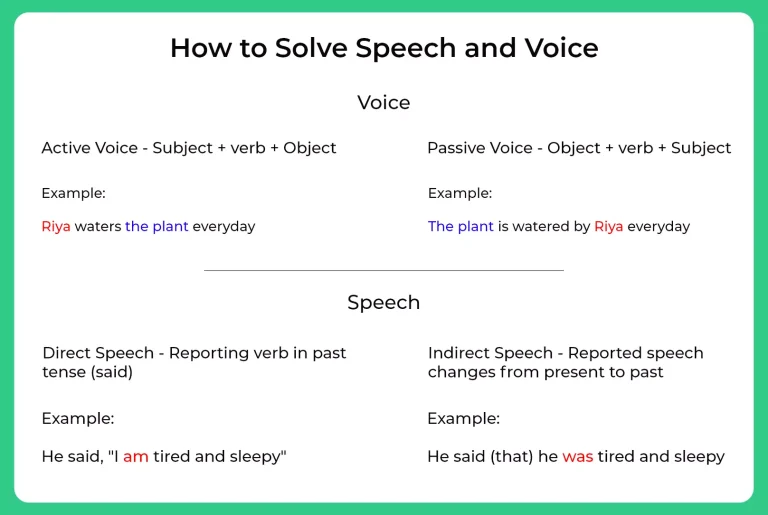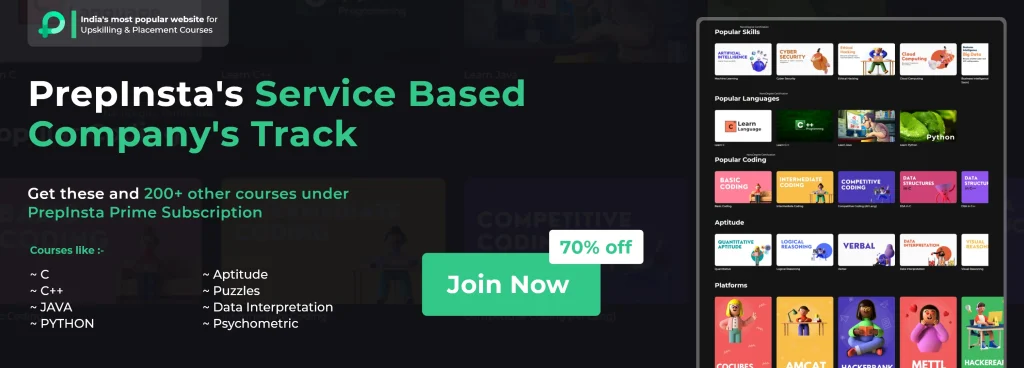Verbal Menu
- Basic Grammar
- Speech and Voices
- Tenses
- Articles
- Tenses and Articles
- Idioms and Phrases
- Subject Verb Agreement
- Prepositions and Conjunction
- Selecting Words
- Relative Pronoun
- Sentence Completion
- Sentence Ordering
- Contextual Vocabulary
- Jumbled Sentence
- Sentence Formation
- Error Identification
- Sentence Improvement and Construction
- Cloze Test
- Fill in the blanks
- Paragraph Ordering
- Para Jumbles
- Synonyms and Antonyms
- Synonyms
- Antonyms
- Reading Comprehension
- Get Off-campus Drive Updates
- Get Hiring Updates
- Contact US
PREPINSTA PRIME
How To Solve Speech & Voices Quickly
How To Solve Speech and Voices Questions
The questions relating to Speech and Voices are very common in any selection examination. They might be given as spotting error, sentence completion, fill up, or direct voice and speech conversion questions. Let’s first discuss their definition and How to solve Speech and Voices Questions then we will move on to their types and examples.

How To Solve Speech and Voices
Voice Rules
There are basically 2 types of voices
- Active Voice
- Passive Voice
Active voice:
When the subject performs the action stated by the verb in the sentence, it is known as Active Voice. Sentences in the Active Voice are simple as the main focus is on the subject.
Arrangement of Active Voice: Subject + Verb + Object
Example: I am drinking banana shake
Now here, I is the subject, drinking is the verb and banana shake is the object.
Passive Voice:
If the subject performed upon the verb, then it is known as passive voice. in this the main emphasis is on the action and not on the one who is doing it i.e. subject. Sentences in the passive voice are complex as the focus in on the actions.
Arrangement of Passive Voice: Object + Verb + Subject
Example: Banana shake is being drunk by me.
Here, banana shake is the subject, drunk is the verb and me is the object. Is you read the sentence again the main focus is on drinking the banana shake and not on me.
Speech Rules
Speech are basically are of 2 types
- Direct speech
- Indirect speech
Direct speech
It is written text or spoken language in which speech or language will be in its original form expressed by the main speaker or writer.
For Example: “You’ll never guess what I’ve just found!” said Tanmay, excitedly.
Indirect speech
It is a form of expressing the written text or spoken language in an indirect but implicit way. It means that it is not as same as expressed by the original speaker or writer. We normally change the tenses of the words under this.
For example: He says, “I am ill “is direct speech, and whereas He says that he is ill is an indirect speech. Or you may remove that from the sentence and make it as: “he says he is ill”.

Speech and Voices – Super Quick Shortcut Table
| Topic | Key Rule | Example |
| Direct to Indirect Speech | Change Tense, Pronoun, Time Words | “I am happy” → She said that she was happy |
| Active to Passive Voice | Object becomes Subject + V3 Form | He eats an apple → An apple is eaten by him |
Prime Course Trailer
Related Banners
Get PrepInsta Prime & get Access to all 200+ courses offered by PrepInsta in One Subscription
How To Solve Speech and Voices - Sample Questions
How to Solve Speech:
In English grammar, Direct speech is a type of language which uses same and original meaning of words made by the speaker. While indirect speech is a form of expressing the written text or spoken language in an indirect but implicit way. Let us understand the topic better and see how to solve speech and voices with the help of some examples:
Type 1: Direct Speech To Indirect Speech
A below mentioned sentence is given in direct speech. Choose the options which best expresses the same sentence in indirect speech.
Question 1
Dravid asked me, ‘Did you see the cricket match on TV last night?’
A. Dravid asked me if I had seen the cricket match on TV the previous night.
B. Dravid asked me if I saw the cricket match on TV the previous night.
C. Dravid asked me whether I had seen the cricket match on TV last night.
D. Dravid asked me did I see the cricket match on TV last night.
Answer: option A
Explanation:
option A is the exact indirect speech of the question. The words have changed and ‘if’ is used correctly before the spoken words of the speaker.
Question 2:
Johny said to his father, ‘I am leaving for India tomorrow.’
A. Johny told his father that he was leaving for India tomorrow.
B. Johny told his father he is leaving for India tomorrow.
C. Johny told his father that he was leaving for India the next day.
D. Johny told his father he would be leaving for India the next day.
Answer: option C
Explanation:
option C is the exact indirect speech of the question. The words have changed and ‘that and next day’ is used correctly.
Question 3:
Prayag said to her, ‘What a hot day!’
A. Prayag exclaimed sorrowfully that it was hot day.
B. Prayag told her that it was a hot day.
C. Prayag exclaimed that it was a hot day.
D. Prayag said that it was a hot day.
Answer: option C
Explanation:
option C is the exact indirect speech of the question. As per the rules to show emotions and surprises interjections should be used. Hence option C is correct.
Type 2: Indirect Speech To Direct Speech
Question 1:
The professor said that water boils at 100°C.
A. The professor said, “Water will boil at 100°C.”
B. The professor said, “Water boils at 100°C.”
C. The professor says, “Water boils at 100°C.”
D. The professor said, “Water boiled at 100°C.”
E. None of these
Answer: option B
Explanation:
Option B as it narrates the question properly as direct speech. The spoken words are enclosed in inverted commas.
Question 2:
Prachi said that Rishi had taken his book with him
A. Prachi said, ‘Rishi, why have you taken my book with you ?’
B. Prachi said to Rishi, ‘You have taken my book with you.’
C. Prachi told to Rishi, ‘You have taken my book with you.’
D. Prachi said to Rishi, ‘He has taken my book with him’.
E. None of these
Answer: option B
Explanation:
Option B. It is the correct answer as it is the proper representation of the question in the direct speech. Words spoken by the speaker are marked in inverted commas.
Question 3:
She told her mother that she was going to the market
A. she said : I am going to the market
B. she told: will I go to the market
C. she asked: shall I go to the market
D. she told: will she go to the market
Answer: option A
Explanation:
Option A is the correct answer as it is the proper representation of the question in the direct speech.
Also Check Out
How to Solve Voices:
When a subject acts on the object directly, the sentence is in Active voice form. However if the object acts upon through the subject, the sentence is in Passive voice form. Let’s try some exercises to know the topic precisely.
Type 1: Active Voice:
Change The Following Sentence Into The Passive Voice (Question 1-3)
Question 1:
Radheshyam teaches Math.
Math ………………. by Radheshyam.
A. taught
B. is taught
C. was taught
D. none of the above
Answer: option B
Explanation:
As per the formula first object will come then verb and then subject. Hence here the object is Maths, teach is verb and Radheshyam is subject. So the correct sentence will be: Maths is taught by Radheshyam
Question 2:
Somya sent the report yesterday.
The report ………………. yesterday.
A. is sent by somya
B. was sent by somya
C. had sent by somya
D. none of the above
Answer: option B
Explanation:
As per the formula first object will come then verb and then subject. Hence the correct sentence will be: The report was sent by somya yesterday.
Question 3:
Gimove wore a blue shirt.
A blue shirt ……………….. by Gimove.
A. wore
B. was wore
C. was worn
D. none of the above
Answer: option C
Explanation:
As per the formula first object will come then verb and then subject. Hence the correct sentence will be: A blue shirt was worn by Gimove.
Type 2: Passive Voice
Change the following sentence into the active voice. (question 1-3)
Question 1
The child was fed by the mother.
A. The mother fed the child
B. The mother fed to the child
C. The child was fed
D. None of the above
Answer: option A
Explanation:
As per rules subject should come first then verb and then object. Option A follows the rule correctly.
Question 2:
The assignment has been completed by the teammates.
A. Teammates have been completed the assignment
B. Teammates have completed the assignment
C. Teammates completed the assignment
D. None of the above
Answer: option B
Explanation:
As per rules subject should come first then verb and then object. Option B follows the rule correctly.
Question 3:
Chandrika is being examined by the doctor.
A. The doctor is checking chandrika
B. Checkup is made by the doctor
C. The doctor is examining chandrika
D. None of the above
Answer: option C
Explanation:
As per rules subject should come first then verb and then object. Option C follows the rule correctly.
Also Check Out
Also Check:
- Basic Grammar – Questions | Rules | How to Solve Quickly | Tricks & Shortcuts
- Speech and Voices – Questions | Rules | How to Solve Quickly | Tricks & Shortcuts
- Tenses – Questions | Rules | How to Solve Quickly | Tricks & Shortcuts
- Tenses and Articles – Questions | Rules | How to Solve Quickly | Tricks & Shortcuts
- Idioms and Phrases – Questions | Rules | How to Solve Quickly | Tricks & Shortcuts
- Subject Verb Agreement – Questions | Rules | How to Solve Quickly | Tricks & Shortcuts
- Prepositions and Conjunction – Questions | Rules | How to Solve Quickly | Tricks & Shortcuts
- Selecting Words – Questions | Rules | How to Solve Quickly | Tricks & Shortcuts
- Relative Pronoun – Questions | Rules | How to Solve Quickly | Tricks & Shortcuts
- Sentence Completion- Questions | Rules | How to Solve Quickly | Tricks & Shortcuts
- Basic Grammar
Questions
Rules
How to Solve Quickly
Tricks & Shortcuts - Speech and Voices
Questions
Rules
How to Solve Quickly
Tricks & Shortcuts - Tenses
Questions
Rules
How to Solve Quickly
Tricks & Shortcuts - Tenses and Articles
Questions
Rules
How to Solve Quickly
Tricks & Shortcuts - Idioms and Phrases
Questions
Rules
How to Solve Quickly
Tricks & Shortcuts - Subject Verb Agreement
Questions
Rules
How to Solve Quickly
Tricks & Shortcuts - Prepositions and Conjunction
Questions
Rules
How to Solve Quickly
Tricks & Shortcuts - Selecting Words
Questions
Rules
How to Solve Quickly
Tricks & Shortcuts - Relative Pronoun
Questions
Rules
How to Solve Quickly
Tricks & Shortcuts - Sentence Completion
Questions
Rules
How to Solve Quickly
Tricks & Shortcuts
Get over 200+ course One Subscription
Courses like AI/ML, Cloud Computing, Ethical Hacking, C, C++, Java, Python, DSA (All Languages), Competitive Coding (All Languages), TCS, Infosys, Wipro, Amazon, DBMS, SQL and others

 Apply For Jobs
Apply For Jobs Get Hiring Updates
Get Hiring Updates




Login/Signup to comment